Underground Food Farms as a Climate-Friendly Alternative Form of Urban Agriculture
Abstract
1. Introduction
2. Materials and Methods
- ○
- Under what conditions can underground farms become a real element of the urban food system, and in what ways can they strengthen the urban metabolism and support the city in adapting to climate change?
- ○
- What are the key strengths and weaknesses of underground urban farms, and what opportunities and threats arise from the political, social, and environmental context? Which of these factors are the most significant, and how should they be prioritized?
- ○
- What strategies for integrating underground farms into the urban fabric can be developed in order to best utilize their potential and minimize environmental risk?
- ○
- Can underground urban farms support processes of including various social groups in joint activities within their space, and is their integration into ecological education of city residents possible?
3. Results
3.1. Urban and Peri-Urban Agriculture
3.2. Underground Farms as an Alternative Form of Urban Agriculture
3.3. Technologies for Underground Cultivation
3.4. Underground Farms as an Element Supporting Urban Metabolism and Resilience to Climate Change
3.5. Social and Educational Dimensions of Urban Underground Agriculture
3.6. Integration of Underground Farm Implementation into Urban Fabrics Considering Municipal and Climate Policies
3.7. Economic Considerations of Underground Farms
4. Discussion
Limitations and Future Directions
5. Conclusions
- Integration with urban circular economy systems through resource recovery and reuse;
- Strong linkages with renewable energy sources and urban energy transition strategies, which allow both the reduction in operational costs and the lowering of the carbon footprint;
- Continuous building of positive social perception of underground farms through diverse educational activities, by embedding them into local food strategies and the adaptation of cities to climate change.
- Actual integration of underground farms with strategic documents, including urban, climate, and food policies, as well as crisis response strategies and social participation.
- Creation of incentive systems and financial support for the construction and redevelopment of underground areas to implement underground farms in urban fabrics, as well as the possibility of obtaining investment relief and grants for social projects.
- Promotion of underground farm pilot projects covering various types of city undergrounds.
- Initiation of information campaigns to build ecological and educational awareness that allow the participation of city residents and the use of farms as spaces for creating joint cooperatives, eliminating social differences and barriers.
- Development of tools and forms for assessing the potential of implementing underground food farms in a given space and introducing them as analytical tools in urban design practices.
- Development of tools for assessing the environmental impact of food-producing underground farms.
Supplementary Materials
Author Contributions
Funding
Institutional Review Board Statement
Informed Consent Statement
Data Availability Statement
Conflicts of Interest
References
- United Nations, Department of Economic and Social Affairs, Population Division. World Urbanization Prospects: The 2018 Revision; United Nations: New York, NY, USA, 2019; Available online: https://population.un.org/wup/assets/WUP2018-Report.pdf (accessed on 15 May 2025).
- United Nations, Department of Economic and Social Affairs, Population Division. World Urbanization Prospects: The 2018 Revision—Key Facts; United Nations: New York, NY, USA, 2019; Available online: https://population.un.org/wup/assets/WUP2018-KeyFacts.pdf (accessed on 15 May 2025).
- McPhearson, T.; Kabisch, N.; Frantzeskaki, N. (Eds.) Nature-Based Solutions for Cities. Edward Elgar Publishing. 2023. Available online: https://arhiv2023.skupnostobcin.si/wp-content/uploads/2023/08/nbs-for-cities.pdf (accessed on 15 May 2025).
- Kousar, S.; Ahmed, F.; Pervaiz, A.; Bojnec, Š. Food Insecurity, Population Growth, Urbanization and Water Availability: The Role of Government Stability. Sustainability 2021, 13, 12336. [Google Scholar] [CrossRef]
- Asaki, F.A.; Oteng-Abayie, E.F.; Baajike, F.B. Effects of Water, Energy, and Food Security on Household Well-Being. PLoS ONE 2024, 19, e0307017. [Google Scholar] [CrossRef]
- Hölscher, K.; Frantzeskaki, N. Perspectives on Urban Transformation Research: Transformations in, of and by Cities. Urban Transform. 2021, 3, 2. [Google Scholar] [CrossRef]
- Liu, K.; Wang, L.; Zhai, J.; Zhao, Y.; Deng, H.; Li, X. Impact of Urbanization on Water Resource Competition Between Energy and Food: A Case Study of Jing-Jin-Ji. Sustainability 2025, 17, 571. [Google Scholar] [CrossRef]
- Fox-Kämper, R.; Kirby, C.K.; Specht, K.; Cohen, N.; Ilieva, R.; Caputo, S.; Schoen, V.; Hawes, J.K.; Poniży, L.; Béchet, B. The Role of Urban Agriculture in Food–Energy–Water Nexus Policies: Insights from Europe and the U.S. Landsc. Urban Plan. 2023, 239, 104848. [Google Scholar] [CrossRef]
- Schulterbrandt-Gragg, R.; Anandhi, A.; Jiru, M.; Usher, K.M. A Conceptualization of the Urban Food-Energy-Water Nexus (FEW) Sustainability Paradigm: Modeling from Theory to Practice. Front. Environ. Sci. 2018, 6, 133. [Google Scholar] [CrossRef]
- Macalou, M.; Keita, S.I.; Coulibaly, A.B.; Diamoutene, A.K. Urbanization and Food Security: Evidence from Mali. Front. Sustain. Food Syst. 2023, 7, 1168181. [Google Scholar] [CrossRef]
- Vilar-Compte, M.; Burrola-Méndez, S.; Lozano-Marrufo, A.; Ferré-Eguiluz, I.; Flores, D.; Gaitán-Rossi, P.; Teruel, G.; Pérez-Escamilla, R. Urban Poverty and Nutrition Challenges Associated with Accessibility to a Healthy Diet: A Global Systematic Literature Review. Int. J. Equity Health 2021, 20, 40. [Google Scholar] [CrossRef] [PubMed]
- Lagi, M.; Bertrand, K.Z.; Bar-Yam, Y. The Food Crises and Political Instability in North Africa and the Middle East. Available online: https://static1.squarespace.com/static/5b68a4e4a2772c2a206180a1/t/5c0036b9c2241b0a1e7b5b56/1716920068415/food_crises.pdf (accessed on 25 May 2025).
- FAO. Urbanization Affects Agrifood Systems Across the Rural–Urban Continuum Creating Challenges and Opportunities to Access Affordable Healthy Diets. State of Food Security and Nutrition in the World, FAO. 2023. Available online: https://www.fao.org/3/cc3017en/online/state-food-security-and-nutrition-2023/urbanization-affects-agrifood-systems.html (accessed on 26 May 2025).
- Yuan, X.; Li, S.; Chen, J.; Yu, H.; Yang, T.; Wang, C.; Huang, S.; Chen, H.; Ao, X. Impacts of Global Climate Change on Agricultural Production. Agronomy 2024, 14, 1360. [Google Scholar] [CrossRef]
- Gomiero, T. Soil Degradation, Land Scarcity, and Food Security. Sustainability 2016, 8, 281. [Google Scholar] [CrossRef]
- Turral, H.; Burke, J.; Faurès, J.M. FAO Report, Climate Change, Water and Food Security. FAO. 2008. Available online: https://www.fao.org/4/i2096e/i2096e.pdf (accessed on 28 May 2025).
- Xue, H.; Zhai, Y.; Su, W.M.; He, Z. Governance and Actions for Resilient Urban Food Systems in the Era of COVID-19: Lessons and Challenges in China. Agriculture 2023, 13, 1681. [Google Scholar] [CrossRef]
- Ušča, M.; Tisenkopfs, T. The Resilience of Short Food Supply Chains During the COVID 19 Pandemic: A Case Study of a Direct Purchasing Network. Front. Sustain. Food Syst. 2023, 7, 1146446. [Google Scholar] [CrossRef]
- Hobbs, J.E. Food Supply Chains During the COVID 19 Pandemic. Can. J. Agric. Econ. 2020, 68, 171–176. [Google Scholar] [CrossRef]
- Hassen, B.T.; El Bilali, H. Conflict in Ukraine and the Unsettling Ripples: Implications on Food Systems and Development in North Africa. Agric. Food Secur. 2024, 13, 16. [Google Scholar] [CrossRef]
- Hassen, T.B.; El Bilali, H. Impact of the Russia–Ukraine War on Global Food Security: Towards More Sustainable and Resilient Food Systems? Foods 2022, 11, 2301. [Google Scholar] [CrossRef] [PubMed]
- Bin-Nashwan, S.A.; Hassan, M.K.; Muneeza, A. Russia–Ukraine conflict: 2030 Agenda for SDGs hangs in the balance. Int. J. Ethics Syst. 2024, 40, 3–16. [Google Scholar] [CrossRef]
- Devecchi, M.; Ghersi, A.; Pilo, A.; Nicola, S. Landscape and Agriculture 4.0: A Deep Farm in Italy in the Underground of a Public Historical Garden. Horticulturae 2023, 9, 417. [Google Scholar] [CrossRef]
- Matacz, P.; Świątek, L. The Unwanted Heritage of Prefabricated Wartime Air Raid Shelters—Underground Space Regeneration Feasibility for Urban Agriculture to Enhance Neighbourhood Community Engagement. Sustainability 2021, 13, 12238. [Google Scholar] [CrossRef]
- Vatistas, C.; Avgoustaki, D.D.; Bartzanas, T. A Systematic Literature Review on Controlled-Environment Agriculture: How Vertical Farms and Greenhouses Can Influence the Sustainability and Footprint of Urban Microclimate with Local Food Production. Atmosphere 2022, 13, 1258. [Google Scholar] [CrossRef]
- Graamans, L.; Baeza, E.; van den Dobbelsteen, A.; Tsafaras, I.; Stanghellini, C. Plant factories versus greenhouses: Comparison of resource use efficiency. Agric. Syst. 2018, 160, 31–43. [Google Scholar] [CrossRef]
- Dietze, V.; Alhashemi, A.; Feindt, P.H. Controlled-environment agriculture for an urbanised world? A comparative analysis of the innovation systems in London, Nairobi and Singapore. Food Secur. 2024, 16, 371–396. [Google Scholar] [CrossRef]
- Schueller, W.; Diem, C.; Hinterplattner, M.; Stangl, J.; Conrady, B.; Gerschberger, M.; Thurner, S. Propagation of Disruptions in Supply Networks of Essential Goods: A Population-Centered Perspective of Systemic Risk. 2022. Available online: https://pure.fh-ooe.at/ws/portalfiles/portal/56495967/2201.13325v1.pdf (accessed on 25 May 2025).
- Savary, S.; Akter, S.; Almekinders, C.; Harris, J.; Korsten, L.; Rötter, R.; Waddington, S.; Watson, D. Mapping Disruption and Resilience Mechanisms in Food Systems. Food Secur. 2020, 12, 695–717. [Google Scholar] [CrossRef]
- Xu, H.; Niu, N.; Li, D.; Wang, C. A Dynamic Evolutionary Analysis of the Vulnerability of Global Food Trade Networks. Sustainability 2024, 16, 3998. [Google Scholar] [CrossRef]
- Dyson, E.; Helbig, R.; Avermaete, T.; Halliwell, K.; Calder, P.C.; Brown, L.R.; Ingram, J.; Popping, B.; Verhagen, H.; Boobis, A.R.; et al. Impacts of the Ukraine–Russia Conflict on the Global Food Supply Chain and Building Future Resilience. Eurochoices 2023, 22, 18–26. [Google Scholar] [CrossRef]
- Pasanen, T.M.; Voutilainen, M.; Helske, J.; Högmander, H. A Bayesian Spatio-Temporal Analysis of Markets During the Finnish 1860s Famine. J. R. Stat. Soc. Ser. C Appl. Stat. 2022, 71, 1282–1302. [Google Scholar] [CrossRef]
- Dijkman, J. Managing Food Crises: Urban Relief Stocks in Pre-Industrial Cities of the Netherlands. Past Present 2021, 251, 41–74. [Google Scholar] [CrossRef]
- Puma, M.J.; Bose, S.; Chon, S.Y.; Cook, B.I. Assessing the Evolving Fragility of the Global Food System. Environ. Res. Lett. 2015, 10, 024007. [Google Scholar] [CrossRef]
- Soffantini, G. Food insecurity and political instability during the Arab Spring. Glob. Food Secur. 2020, 26, 100400. [Google Scholar] [CrossRef]
- Lähde, V.; Garschagen, M.; Romero-Lankao, P.; Müller, B.; Eakin, H.; Jäger, J. The Crises Inherent in the Success of the Global Food System. Ecol. Soc. 2023, 28, 16. [Google Scholar] [CrossRef]
- Roman, M.; Górecka, A.; Domagała, J. The Linkages between Crude Oil and Food Prices. Energies 2020, 13, 6545. [Google Scholar] [CrossRef]
- Tadesse, G.; Algieri, B.; Kalkuhl, M.; von Braun, J. Drivers and triggers of international food price spikes and volatility. Food Policy 2014, 47, 117–128. [Google Scholar] [CrossRef]
- Jafari, Y.; Misaki, E.; Casoni, G.; Fagiolo, G. Multiple Dimensions of Resilience in Agricultural Trade Networks. Q Open 2024, 4, qoae024. [Google Scholar] [CrossRef]
- Johnston, D.; Bargawi, H. The 2007–2008 World Food Crisis: Focusing on the Structural Causes. Centre for Development Policy and Research. 2010. Available online: https://openresearch.lsbu.ac.uk/download/45988d6d5c5e02224178488e6c2fbd6ecf0b322f1340be066564e2ecc096480a/178808/The%202007-2008%20World%20Food%20Crisis.pdf (accessed on 30 May 2025).
- Clapp, J. The 2007–2008 Food Crisis and the Global Governance of Food Aid. In Hunger in the Balance: The New Politics of International Food Aid; Cornell University Press: New York, NY, USA, 2015; pp. 139–160. [Google Scholar] [CrossRef]
- Tubiello, F.N.; Salvatore, M.; Ferrara, A.; House, J.; Federici, S.; Rossi, S.; Biancalani, R.; Jacobs, H.; Flammini, A.; Prosperi, P.; et al. The Contribution of Agriculture, Forestry and Other Land Use Activities to Global Warming, 1990–2012. Glob. Change Biol. 2015, 21, 2655–2660. [Google Scholar] [CrossRef]
- Crippa, M.; Solazzo, E.; Guizzardi, D.; Monforti-Ferrario, F.; Tubiello, F.N.; Leip, A. Food Systems Are Responsible for a Third of Global Anthropogenic GHG Emissions. Nat. Food 2021, 2, 198–209. [Google Scholar] [CrossRef] [PubMed]
- Twine, R. Emissions due to Animal Agriculture—16.5% Is the New Estimate. Sustainability 2021, 13, 6276. [Google Scholar] [CrossRef]
- Lehner, P.H. The Climate Crisis and Agriculture. Environ. Law Rep. 2022, 52, 10096. [Google Scholar]
- Lal, R. Soil Carbon Sequestration Impacts on Global Climate Change and Food Security. Science 2004, 304, 1623–1627. [Google Scholar] [CrossRef]
- Ingrao, C.; Strippoli, R.; Lagioia, G.; Huisingh, D. Water Scarcity in Agriculture: An Overview of Causes, Impacts and Approaches for Reducing the Risk. Heliyon 2023, 9, e18507. [Google Scholar] [CrossRef] [PubMed]
- Liu, X.; Liu, W.; Tang, Q.; Liu, B.; Wada, Y.; Yang, H. Global Agricultural Water Scarcity Assessment Incorporating Blue and Green Water Availibility Under Future Climate Change. Earth’s Future 2022, 10, e2021EF002567. [Google Scholar] [CrossRef]
- FAO. The State of Food and Agriculture 2020. In Overcoming Water Challenges in Agriculture; FAO: Rome, Italy, 2020. [Google Scholar] [CrossRef]
- Carwardine, J.; Martin, T.G.; Firn, J.; Reyes, R.P.; Nicol, S.; Reeson, A.; Grantham, H.S.; Stratfors, D.; Kehoe, L.; Chades, I. Priority Threat Management for Biodiversity Conservation: A Handbook. J. Appl. Ecol. Br. Ecol. Soc. 2019, 56, 481–490. [Google Scholar] [CrossRef]
- Andow, D.A.; Zwahlen, C. Assessing Environmental Risks of Transgenic Plants. Ecol. Lett. 2006, 9, 196–214. [Google Scholar] [CrossRef] [PubMed]
- Pretty, J. Agricultural Sustainability: Concepts, Principles and Evidence. Philos. Trans. R Soc. Lond. B Biol. Sci. 2007, 363, 447–465. [Google Scholar] [CrossRef]
- Sonnino, R.; Marsden, T. Beyond the Divide: Rethinking Relationships between Alternative and Conventional Food Networks in Europe. J. Econ. Geogr. 2006, 6, 181–199. [Google Scholar] [CrossRef]
- FAO. The State of Food and Agriculture 2019. In Moving Forward on Food Loss and Waste Reduction; FAO: Rome, Italy, 2019; Available online: https://www.fao.org/3/ca6030en/ca6030en.pdf (accessed on 12 August 2025).
- Barthel, S.; Isendahl, C. Urban Gardens, Agriculture, and Water Management: Sources of Resilience for Long-Term Food Security in Cities. Ecol. Econ. 2013, 86, 224–234. [Google Scholar] [CrossRef]
- McClintock, N. Why Farm the City? Theorizing Urban Agriculture through a Lens of Metabolic Rift. Camb. J. Reg. Econ. Soc. 2010, 3, 191–207. [Google Scholar] [CrossRef]
- Fattibene, D.; Recanati, F.; Dembska, K.; Antonelli, M. Urban Food Waste: A Framework to Analyse Policies and Initiatives. Resources 2020, 9, 99. [Google Scholar] [CrossRef]
- Choochote, P.; Supakata, N. Urban Food Waste Generation and Sustainable Management Strategies: A Case Study of Nonthaburi Municipality, Thailand. Sci. Rep. 2025, 15, 18405. [Google Scholar] [CrossRef] [PubMed]
- Gustavsson, J.; Cederberg, C.; van Otterdijk, R.; Meybeck, A.; FAO. Global Food Losses and Food Waste—Extent, Causes and Prevention. In Food and Agriculture; Organization of the United Nations: Rome, Italy, 2011. [Google Scholar]
- Beaulac, J.; Kristjansson, E.; Cummins, S. A Systematic Review of Food Deserts, 1966–2007. Prev. Chronic Dis. 2009, 6, A105. [Google Scholar]
- Walker, R.E.; Keane, C.R.; Burke, J.G. Disparities and Access to Healthy Food in the United States: A Review of Food Deserts Literature. Health Place 2010, 16, 876–884. [Google Scholar] [CrossRef] [PubMed]
- Hebinck, A.; Selomane, O.; Veen, E.; de Vrieze, A.; Hasnain, S.; Sellberg, M.; Sovová, L.; Thompson, K.; Vervoort, J.; Wood, A. Exploring the transformative potential of urban food. NPJ Urban Sustain. 2021, 1, 38. [Google Scholar] [CrossRef]
- Skar, S.L.G.; Pineda-Martos, R.; Timpe, A.; Pölling, B.; Bohn, K.; Külvik, M.; Delgado, C.; Pedras, C.M.; Paço, T.A.; Ćujić, M.; et al. Urban Agriculture as a Keystone Contribution Towards Securing Sustainable and Healthy Development for Cities in the Future. Blue-Green Syst. 2020, 2, 1–27. [Google Scholar] [CrossRef]
- Gourichon, H. How Can Urban Food Policies Contribute to a Sustainable Economy? Lessons from London. DPU Working Paper Bartlett UCL. 2020. Available online: https://www.ucl.ac.uk/bartlett/sites/bartlett/files/wp200_gourichon.pdf (accessed on 13 August 2025).
- Milan Urban Food Policy Pact (MUFPP)—Framework for Action; Municipality of Milan. 2015. Available online: https://www.milanurbanfoodpolicypact.org/wp-content/uploads/2020/12/Milan-Urban-Food-Policy-Pact-EN.pdf (accessed on 13 August 2025).
- City of Toronto. TransformTO Net Zero Strategy: 2024 Annual Report on Implementation Progress. 2025. Available online: https://www.toronto.ca/legdocs/mmis/2025/ie/bgrd/backgroundfile-255754.pdf (accessed on 15 August 2025).
- Ajuntament de Barcelona. Informe Anual IMU 2024—Memoria IMU 2024 (2024 Annual Report). 2025. Available online: https://ajuntament.barcelona.cat/instituturbanisme/sites/default/files/2025-06/EN-Memoria_IMU24_web.pdf (accessed on 15 August 2025).
- City of Copenhagen. Copenhagen Municipal Plan 2024—Abridged Version. 2025. Available online: https://kp24.kk.dk/copenhagen-municipal-plan-2024 (accessed on 15 August 2025).
- FAO. The State of Food and Agriculture 2021. Making Agrifood Systems More Resilient to Shocks and Stresses. 2021. Available online: https://www.fao.org/3/cb4476en/cb4476en.pdf (accessed on 15 August 2025).
- European Environment Agency (EEA). Urban Sustainability in Europe—What Is Driving Cities’ Environmental Performance? 2022. Available online: https://www.eea.europa.eu/en/analysis/publications/urban-sustainability-in-europe-what (accessed on 15 August 2025).
- Benke, K.; Tomkins, B. Future food-production systems: Vertical farming and controlled-environment agriculture. Sustain. Sci. Pract. Policy 2017, 13, 13–26. [Google Scholar] [CrossRef]
- Beacham, A.M.; Vickers, L.H.; Monaghan, J.M. Vertical Farming: A Summary of Approaches to Growing Skywards. J. Hortic. Sci. Biotechnol. 2019, 94, 277–283. [Google Scholar] [CrossRef]
- Kennedy, C.; Cuddihy, J.; Engel-Yan, J. The changing metabolism of cities. J. Ind. Ecol. 2007, 11, 43–59. [Google Scholar] [CrossRef]
- Ilieva, R.T.; Cohen, N.; Israel, M.; Specht, K.; Fox-Kämper, R.; Fargue-Lelièvre, A.; Poniży, L.; Schoen, V.; Caputo, S.; Kirby, C.K.; et al. The Socio-Cultural Benefits of Urban Agriculture: A Review of the Literature. Land 2022, 11, 622. [Google Scholar] [CrossRef]
- Weihrich, H. The TOWS matrix—A tool for situational analysis. Long Range Plan. 1982, 15, 54–66. [Google Scholar] [CrossRef]
- Kurttila, M.; Pesonen, M.; Kangas, J.; Kajanus, M. Utilizing the Analytic Hierarchy Process (AHP) in SWOT Analysis—A Hybrid Method and Its Application to a Forest-Certification Case. For. Policy Econ. 2000, 1, 41–52. [Google Scholar] [CrossRef]
- Terrados, J.; Almonacid, G.; Hontoria, L. Regional Energy Planning through SWOT Analysis and Strategic Planning Tools.: Impact on renewables development. Renew. Sustain. Energy Rev. 2007, 11, 1275–1287. [Google Scholar] [CrossRef]
- Mwetulundila, P.; Indongo, N. The benefits of urban agriculture toward sustainable cities. Urban Agric. Reg. Food Syst. 2025, 10, e70016. [Google Scholar] [CrossRef]
- Dubová, L.; Macháč, J. Improving the quality of life in cities using community gardens: From benefits for members to benefits for all local residents. GeoScape 2019, 13, 68–78. [Google Scholar] [CrossRef]
- Chan, J.; DuBois, B.; Tidball, K.G. Refuges of local resilience: Community gardens in post-Sandy New York City. Urban For. Urban Green. 2015, 14, 625–635. [Google Scholar] [CrossRef]
- Mees, C. More shared urban open spaces: Resiliency on demand. Agric. Hum. Values 2020, 37, 609–610. [Google Scholar] [CrossRef]
- Egerer, M.; Liere, H.; Lucatero, A.; Philpott, S.M. Plant damage in urban agroecosystems varies with local and landscape factors. Ecosphere 2020, 11, e03074. [Google Scholar] [CrossRef]
- Piorr, A.; Ravetz, J.; Tosics, I. Peri-Urbanisation in Europe: Towards Integrated Rural-Urban Development. European Network for Sustainable Territorial Development (PLUREL). 2015. Available online: https://www.openspace.eca.ed.ac.uk/wp-content/uploads/2015/12/Peri_Urbanisation_in_Europe_printversion.pdf (accessed on 13 August 2025).
- Kleemann, J.; Struve, B.; Spyra, M. Conflicts in Urban Peripheries in Europe. Land Use Policy 2023, 133, 106849. [Google Scholar] [CrossRef]
- Brinkley, C. Evaluating the Benefits of Peri-Urban Agriculture. J. Plan. Lit. 2012, 27, 259–269. [Google Scholar] [CrossRef] [PubMed]
- Spyra, M.; Calό, N.C.; Martinez Pasteur, G.J.; Lencinas, M.V.; La Rosa, D. Ecosystem Service Trade-Offs in Peri-Urban Landscapes: Drivers, Governance Obstacles and Improvements. Land 2024, 13, 1061. [Google Scholar] [CrossRef]
- Wilhelm, J.A.; Smith, R.G. Ecosystem services and land sparing potential of urban and peri-urban agriculture: A review. Renew. Agric. Food Syst. 2017, 32, 465–481. [Google Scholar] [CrossRef]
- Parkes, M.G.; Azevedo, D.L.; Domingos, T.; Teixeira, R.F.M. Narratives and Benefits of Agricultural Technology in Urban Buildings: A Review. Atmosphere 2022, 13, 1250. [Google Scholar] [CrossRef]
- Akram, M.W.; Guo, H.; Hu, W. Underground Plant Factory in a Mine Tunnel—Part 1: Conceptual Design and Thermal Simulation. Energy Built Environ. 2025, 6, 1–12. [Google Scholar] [CrossRef]
- World Economic Forum. This WW2 Bunker Is Growing Sustainable Salad Leaves Deep Underground. WEF Agenda. 22 April 2021. Available online: https://www.weforum.org/stories/2021/04/underground-vegetable-garden-sustainable-farming (accessed on 14 August 2025).
- Kim, H. EULAC Foundation. Technologies for Adapting to Climate Change. 2023. Available online: https://eulacfoundation.org/system/files/digital_library/2023-07/s2100001_en.pdf? (accessed on 7 August 2025).
- Wired. Underground Hydroponic Farm. Available online: https://www.wired.com/story/underground-hydroponic-farm (accessed on 10 July 2025).
- Seoul Metropolitan Government. Seoul Opens Korea’s First Smart Metro Farm at Sangdo Station. Available online: https://english.seoul.go.kr/seoul-opens-koreas-first-smart-metro-farm-at-sangdo-station (accessed on 10 July 2025).
- VOA Learning English. South Korean Smart Farm Built Inside Former Road Tunnel. Available online: https://learningenglish.voanews.com/a/south-korean-smart-farm-built-inside-former-road-tunnel/4552507.html (accessed on 10 July 2025).
- The New Yorker. Tribeca’s Hydroponic Underground. Available online: https://www.newyorker.com/magazine/2018/07/09/tribecas-hydroponic-underground (accessed on 10 July 2025).
- RESET. La Caverne—Underground Farming of Mushrooms and Sprouts. Available online: https://en.reset.org/la-caverne-underground-farming-pilzen-und-keimlingen-12172017 (accessed on 10 July 2025).
- ECLO Farm. ECLO Raises €4.7M to Create a High-Tech Circular Organic Mushroom Substrate Factory. Available online: https://eclo.farm/2022/07/eclo-raises-e4-7m-to-create-a-high-tech-circular-organic-mushroom-substrate-factory (accessed on 10 July 2025).
- Interesting Engineering. Taiwan Underground Metro Station Vertical Farm. Available online: https://interestingengineering.com/innovation/taiwan-underground-metro-station-vertical-farm (accessed on 10 July 2025).
- Grönska Stadsodling AB. About Us. Available online: https://www.gronska.org/about-us (accessed on 10 July 2025).
- SIANI. Growing Food in Concrete—Urban Farming Pioneers in Stockholm. Available online: https://www.siani.se/blog/growing-food-concrete-urban-farming-pioneers-stockholm (accessed on 10 July 2025).
- Agritecture. Creating a More Equitable Food System with Underground Vertical Farms. Available online: https://www.agritecture.com/blog/2021/9/28/creating-a-more-equitable-food-system-with-underground-vertical-farms (accessed on 10 July 2025).
- Lozano-Castellanos, L.F.; Navas-Gracia, L.M.; Lozano-Castellanos, I.C.; Correa-Guimaraes, A. Technologies Applied to Artificial Lighting in Indoor Agriculture: A Review. Sustainability 2025, 17, 3196. [Google Scholar] [CrossRef]
- Taha, M.F.; ElMasry, G.; Gouda, M.; Zhou, L.; Liang, N.; Abdalla, A.; Rousseau, D.; Qiu, Z. Recent Advances of Smart Systems and Internet of Things (IoT) for Aquaponics Automation: A Comprehensive Overview. Chemosensors 2022, 10, 303. [Google Scholar] [CrossRef]
- Rahman, M.M.; Field, D.L.; Ahmed, S.M.; Hasan, M.T.; Basher, M.K.; Alameh, K. LED Illumination for High-Quality High-Yield Crop Growth in Protected Cropping Environments. Plants 2021, 10, 2470. [Google Scholar] [CrossRef]
- Singh, D.; Basu, C.; Meinhardt-Wollweber, M.; Roth, B. LEDs for Energy Efficient Greenhouse Lighting. Renew. Sustain. Energy Rev. 2015, 49, 139–147. [Google Scholar] [CrossRef]
- Resource Innovation Institute. HVAC Best Practices Guide for CEA Facilities; RII: Portland, OR, USA, 2022; Available online: https://resourceinnovation.org/wp-content/uploads/2022/06/RII-HvacBPG-2022-v4-1.pdf (accessed on 8 August 2025).
- Pomoni, D.I.; Koukou, M.K.; Vrachopoulos, M.G.; Vasiliadis, L. A Review of Hydroponics and Conventional Agriculture Based on Energy and Water Consumption, Environmental Impact, and Land Use. Energies 2023, 16, 1690. [Google Scholar] [CrossRef]
- Regmi, A.; Rueda-Kunz, D.; Liu, H.; Trevino, J.; Kathi, S.; Simpson, C. Comparing Resource Use Efficiencies in Hydroponic and Aeroponic Production Systems. Technol. Hortic. 2024, 4, e005. [Google Scholar] [CrossRef]
- Witczak, D.; Szymoniak, S. Review of Monitoring and Control Systems Based on Internet of Things. Appl. Sci. 2024, 14, 8943. [Google Scholar] [CrossRef]
- Jans-Singh, M.; Leeming, K.; Choudhary, R.; Girolami, M. Digital Twin of an Urban-Integrated Hydroponic Farm. Data-Centric Eng. 2020, 1, e20. [Google Scholar] [CrossRef]
- Hemming, S.; de Zwart, F.; Elings, A.; Righini, I.; Petropoulou, A. Remote Control of Greenhouse Vegetable Production with Artificial Intelligence—Greenhouse Climate, Irrigation, and Crop Production. Sensors 2019, 19, 1807. [Google Scholar] [CrossRef] [PubMed]
- Elings, A.; Righini, I.; de Zwart, H.F.; Hemming, S.; Petropoulou, A. Remote control of greenhouse cucumber production with artificial intelligence—Results from the first international autonomous challenge. Acta Hortic. 2020, 1294, 81–88. [Google Scholar] [CrossRef]
- Ojo, M.O.; Zahid, A. Deep Learning in Controlled Environment Agriculture: A Review of Recent Advancements, Challenges and Prospects. Sensors 2022, 22, 7965. [Google Scholar] [CrossRef]
- Chen, T.-H.; Lee, M.-H.; Hsia, I.-W.; Hsu, C.-H.; Yao, M.-H.; Chang, F.-J. Develop a Smart Microclimate Control System for Greenhouses through System Dynamics and Machine Learning Techniques. Water 2022, 14, 3941. [Google Scholar] [CrossRef]
- Méndez-Guzmán, H.A.; Padilla-Medina, J.A.; Martínez-Nolasco, C.; Martinez-Nolasco, J.J.; Barranco-Gutiérrez, A.I.; Contreras-Medina, L.M.; Leon-Rodriguez, M. IoT-Based Monitoring System Applied to Aeroponics Greenhouse. Sensors 2022, 22, 5646. [Google Scholar] [CrossRef]
- Bersani, C.; Ruggiero, C.; Sacile, R.; Soussi, A.; Zero, E. Internet of Things Approaches for Monitoring and Control of Smart Greenhouses in Industry 4.0. Energies 2022, 15, 3834. [Google Scholar] [CrossRef]
- Ragothaman, K.; Wang, Y.; Rimal, B.; Lawrence, M. Access Control for IoT: A Survey of Existing Research, Dynamic Policies and Future Directions. Sensors 2023, 23, 1805. [Google Scholar] [CrossRef]
- Nie, Z.; Liu, D.; Meng, C.; Song, R. Research on Thermal Environment of Container Farms: Key Factor Identification and Priority Analysis. Sustainability 2024, 16, 6105. [Google Scholar] [CrossRef]
- Parkes, M.G.; Cubillos Tovar, J.P.; Dourado, F.; Domingos, T.; Teixeira, R.F.M. Life Cycle Assessment of a Prospective Technology for Building-Integrated Production of Broccoli Microgreens. Atmosphere 2022, 13, 1317. [Google Scholar] [CrossRef]
- Canet-Martí, A.; Pineda-Martos, R.; Junge, R.; Bohn, K.; Paço, T.A.; Delgado, C.; Alenčikienė, G.; Skar, S.L.G.; Baganz, G.F.M. Nature-Based Solutions for Agriculture in Circular Cities: Challenges, Gaps, and Opportunities. Water 2021, 13, 2565. [Google Scholar] [CrossRef]
- Deksissa, T.; Trobman, H.; Zendehdel, K.; Azam, H. Integrating Urban Agriculture and Stormwater Management in a Circular Economy to Enhance Ecosystem Services: Connecting the Dots. Sustainability 2021, 13, 8293. [Google Scholar] [CrossRef]
- Agudelo-Vera, C.M.; Leduc, W.R.W.A.; Mels, A.R.; Rijnaarts, H.H.M. Harvesting Urban Resources Towards More Resilient Cities. Resour. Conserv. Recycl. 2012, 64, 3–12. [Google Scholar] [CrossRef]
- Martin, M.; Poulikidou, S.; Molin, E. Exploring the Environmental Performance of Urban Symbiosis for Vertical Hydroponic Farming. Sustainability 2019, 11, 6724. [Google Scholar] [CrossRef]
- Lin, S.; Li, C.; Li, Y.; Chen, L. Exploring Integrative Development of Urban Agglomeration from the Perspective of Urban Symbiosis and Production–Living–Ecological Function. Land 2024, 13, 258. [Google Scholar] [CrossRef]
- Atlas of the Future. Cycloponics Breathes New Life into France’s Underground Car Parks Where They Farm Organic Mushrooms, Endives and Microgreens Right Under the Feet of the City Dwellers. Atlas of the Future, 18 May 2021. Available online: https://atlasofthefuture.org/project/cycloponics-underground-farm/ (accessed on 10 July 2025).
- Caputo, S. Small Scale Soil-Less Urban Agriculture in Europe; Urban Agriculture; Springer Nature: Cham, Switzerland, 2022. [Google Scholar] [CrossRef]
- University of Cambridge. Growing Underground. Available online: https://www.cam.ac.uk/stories/growingunderground (accessed on 12 July 2025).
- Russ, A.; Gaus, M.B. Urban Agriculture Education and Youth Civic Engagement in the U.S.: A Scoping Review. Front. Sustain. Food Syst. 2021, 5, 707896. [Google Scholar] [CrossRef]
- Bobek, D.; Zaff, J.; Li, Y.; Lerner, R.M. Cognitive, Emotional, and Behavioral Components of Civic Action: Towards an Integrated Measure of Civic Engagement. J. Appl. Dev. Psychol. 2009, 30, 615–627. [Google Scholar] [CrossRef]
- Burt, K.G.; Koch, P.; Contento, I. Development of the GREEN (Garden Resources, Education, and Environment Nexus) Tool: An Evidence-Based Model for School Garden Integration. J. Acad. Nutr. Diet. 2017, 117, 1517–1527.e4. [Google Scholar] [CrossRef]
- Reynolds, K. Designing Urban Agriculture Education for Social Justice: Radical Innovation Through Farm School NYC. Int. J. Food Des. 2017, 2, 45–63. [Google Scholar] [CrossRef]
- European Commission. Communication: The European Green Deal; EC: Brussels, Belgium, 2019; Available online: https://commission.europa.eu/strategy-and-policy/priorities-2019-2024/european-green-deal_en (accessed on 10 August 2025).
- European Commission. Communication: Farm to Fork Strategy for a Fair, Healthy and Environmentally-Friendly Food System; EC: Brussels, Belgium, 2020; Available online: https://food.ec.europa.eu/system/files/2020-05/f2f_action-plan_2020_strategy-info_en.pdf (accessed on 8 August 2025).
- European Commission. Food Policy—Orientation Paper of the Food Partnership Under the Urban Agenda for the EU; EC: Brussels, Belgium, 2024; Available online: https://www.urbanagenda.urban-initiative.eu/sites/default/files/2024-10/Food_Orientation_Paper_FINAL_1.pdf (accessed on 10 August 2025).
- United Nations. Transforming Our World: The 2030 Agenda for Sustainable Development; United Nations: New York, NY, USA, 2015; Available online: https://sdgs.un.org/goals (accessed on 12 August 2025).
- Evans, D.L.; Falagán, N.; Hardman, C.A.; Kourmpetli, S.; Liu, L.; Mead, B.R.; Davies, J.A.C. Ecosystem Service Delivery by Urban Agriculture and Green Infrastructure—A Systematic Review. Ecosyst. Serv. 2022, 54, 101405. [Google Scholar] [CrossRef]
- Vähäaho, I. Underground Space Planning in Helsinki. J. Rock Mech. Geotech. Eng. 2014, 6, 387–398. [Google Scholar] [CrossRef]
- FAO.; Rikolto; RUAF. Urban and Peri-Urban Agriculture Sourcebook—From Production to Food Systems; FAO: Rome, Italy, 2022. [Google Scholar] [CrossRef]
- Ellen MacArthur Foundation; SYSTEMIQ. Cities and Circular Economy for Food; Ellen MacArthur Foundation: Cowes, UK, 2019; Available online: https://pacecircular.org/sites/default/files/2019-03/Cities-and-Circular-Economy-for-Food.pdf (accessed on 10 August 2025).
- Government of Ireland. European Union (Resilience of Critical Entities) Regulations 2024. S.I. No. 559/2024. Available online: https://www.irishstatutebook.ie/eli/2024/si/559/made/en/pdf (accessed on 10 August 2025).
- Bobylev, N. Mainstreaming Sustainable Development into a City’s Master Plan: A Case of Urban Underground Space Use. Land Use Policy 2009, 26, 1128–1137. [Google Scholar] [CrossRef]
- von der Tann, L.; Sterling, R.; Zhou, Y.; Metje, N. Systems Approaches to Urban Underground Space Planning and Management—A Review. Undergr. Space 2020, 5, 144–166. [Google Scholar] [CrossRef]
- USDA Economic Research Service. Growth in greenhouses: Controlled environment agriculture production, operations on the rise. Charts of Note, 2 July 2024. Available online: https://www.ers.usda.gov/data-products/charts-of-note/chart-detail?chartId=109422 (accessed on 6 July 2025).
- Barbosa, G.L.; Gadelha, F.D.A.; Kublik, N.; Proctor, A.; Reichelm, L.; Weissinger, E.; Wohlleb, G.M.; Halden, R.U. Comparison of Land, Water, and Energy Requirements of Lettuce Grown Using Hydroponic vs. Conventional Agricultural Methods. Int. J. Environ. Res. Public Health 2015, 12, 6879–6891. [Google Scholar] [CrossRef]
- Donnell, M.; Short, T.; Moore, R.; Draper, C. Hydroponic Greenhouse Lettuce Enterprise Budget; Hydroponic Program Team; The Ohio State University: Columbus, OH, USA, 2011; Available online: https://u.osu.edu/greenhouse/hydroponic-crop-program-economic-budgets/ (accessed on 6 July 2025).
- Kozai, T.; Niu, G.; Takagaki, M. Plant Factory: An Indoor Vertical Farming System for Efficient Quality Food Production; Academic Press: Cambridge, UK, 2015; ISBN 978-0-12-801775-3. [Google Scholar]
- The Economist. Vertical Farming. Does It Really Stack Up? The Economist, 9 December 2010. Available online: http://www.economist.com/node/17647627 (accessed on 6 July 2025).
- Alter, L. The Vertical Farm: Does it Make Sense? Tree Hugger, 22 November 2010. Available online: http://www.treehugger.com/culture/the-vertical-farm-does-it-make-sense-book-review.html (accessed on 6 July 2025).
- Caputo, S.; Schoen, V.; Specht, K.; Grard, B.; Blythe, C.; Cohen, N.; Fox-Kämper, R.; Hawes, J.; Newell, J.; Poniży, L. Applying the Food–Energy–Water Nexus Approach to Urban Agriculture: From FEW to FEWP (Food–Energy–Water–People). Urban For. Urban Green. 2021, 58, 126934. [Google Scholar] [CrossRef]
- European Union. Directive (EU) 2022/2557 of the European Parliament and of the Council of 14 December 2022 on the Resilience of Critical Entities and Repealing Council Directive 2008/114/EC. Available online: https://eur-lex.europa.eu/legal-content/EN/TXT/PDF/?uri=CELEX:32022L2557 (accessed on 12 August 2025).
- Broere, W. Urban Underground Space for Resilient Cities. In Proceedings of the 18th Conference of the Associated Research Centers for the Urban Underground Space. ACUUS 2023; Wu, W., Leung, C.F., Zhou, Y., Li, X., Eds.; Lecture Notes in Civil Engineering; Springer: Singapore, 2024; Volume 471. [Google Scholar] [CrossRef]
- Delmastro, C.; Lavagno, E.; Schranz, L. Underground Urbanism: Master Plans and Sectorial Plans. Tunn. Undergr. Space Technol. 2016, 55, 103–111. [Google Scholar] [CrossRef]
- Doyle, M.R.; Thalmann, P.; Parriaux, A. Underground Potential for Urban Sustainability: Mapping Resources and Their Interactions with the Deep City Method. Sustainability 2016, 8, 830. [Google Scholar] [CrossRef]
- Benis, K.; Ferrão, P. Potential Mitigation of the Environmental Impacts of Food Systems through Urban and Peri-Urban Agriculture (UPA)-A Life Cycle Assessment Approach. J. Clean. Prod. 2017, 140, 784–795. [Google Scholar] [CrossRef]
- International Energy Agency (IEA). World Energy Outlook 2022; IEA: Paris, France, 2022; Available online: https://www.iea.org/reports/world-energy-outlook-2022 (accessed on 15 August 2025).
- World Bank. Green Bonds. Available online: https://www.worldbank.org/en/topic/climatechange/brief/green-bonds (accessed on 15 June 2025).
- Li, C.; Liu, Y.; Wang, X. Geopolitical Risks, Institutional Environment, and Food Price Inflation: Evidence from a Panel of 33 Countries. Appl. Econ. 2024, 56, 1685–1702. [Google Scholar] [CrossRef]
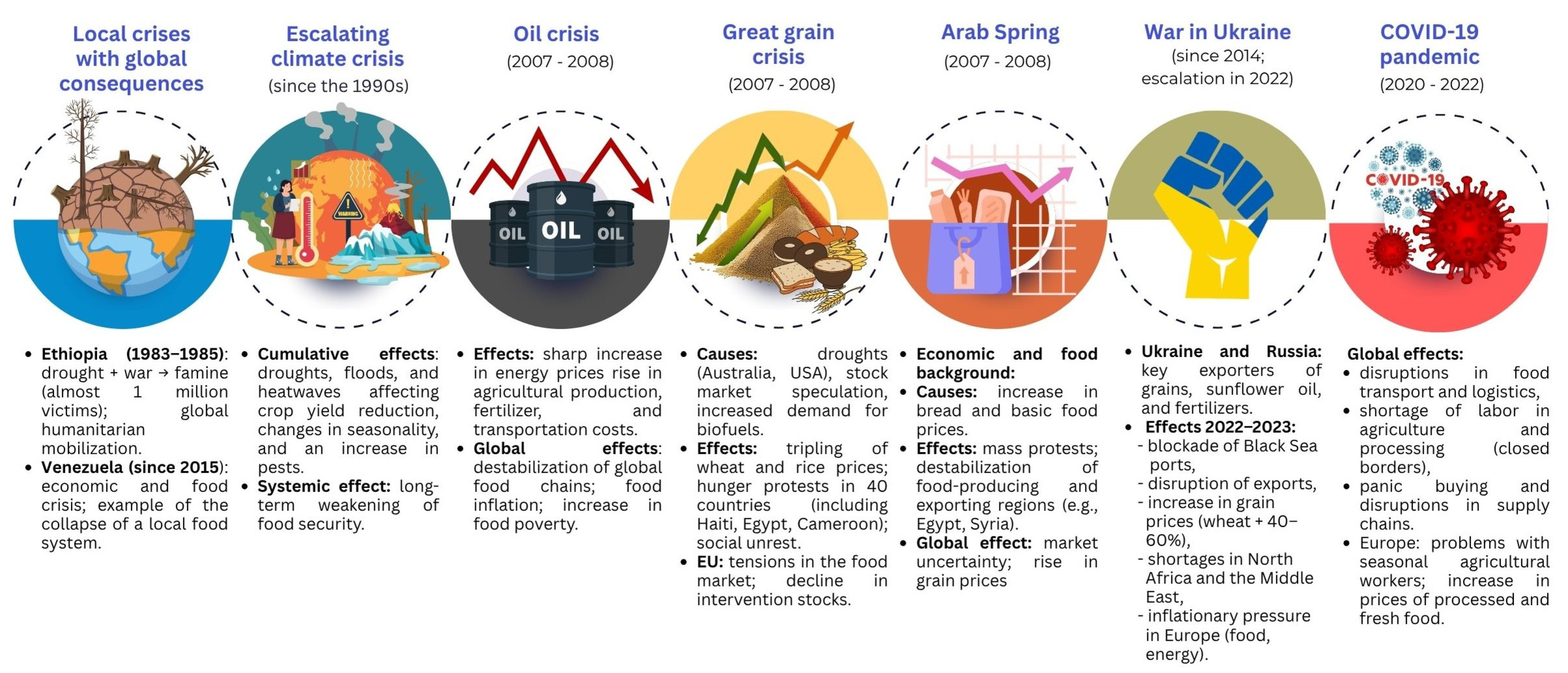
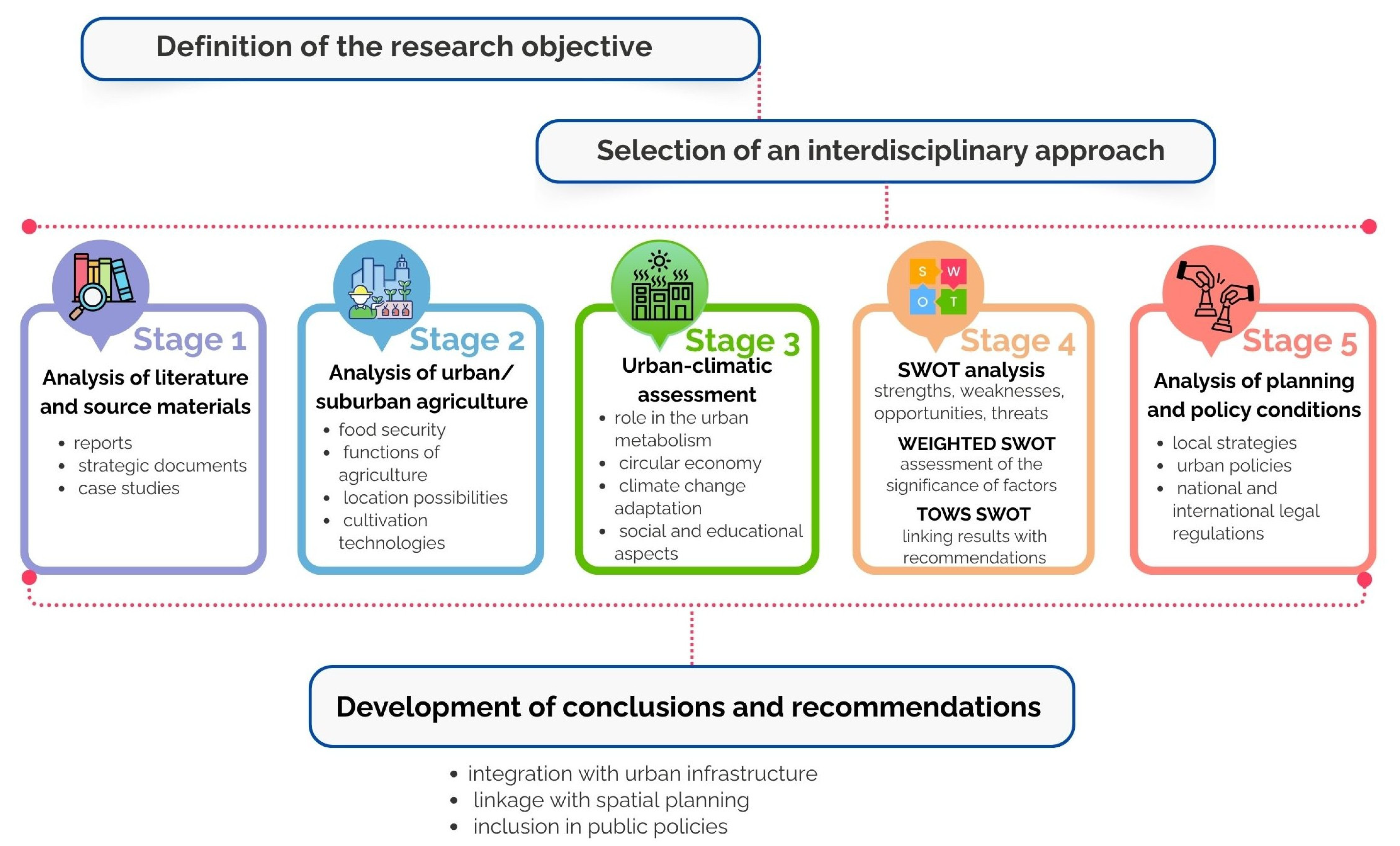
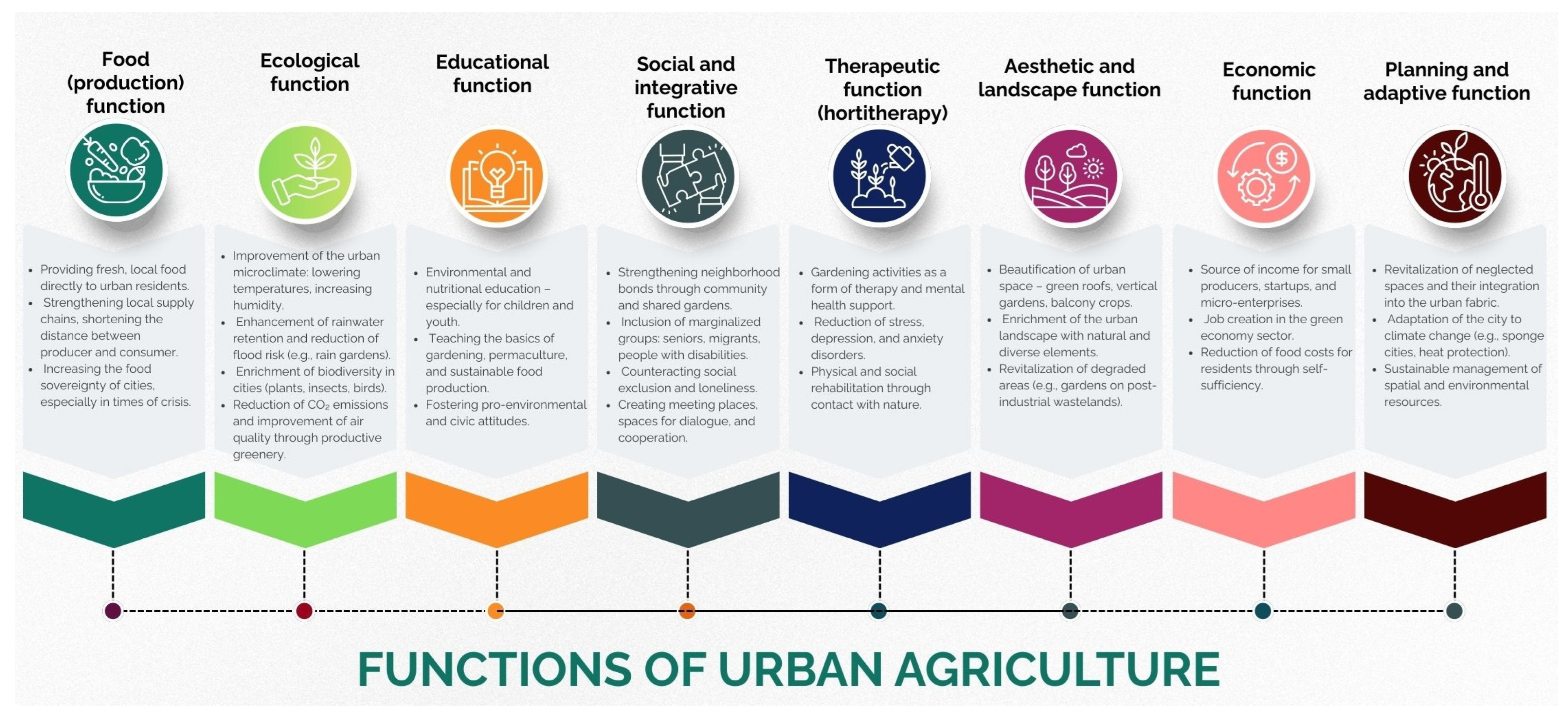
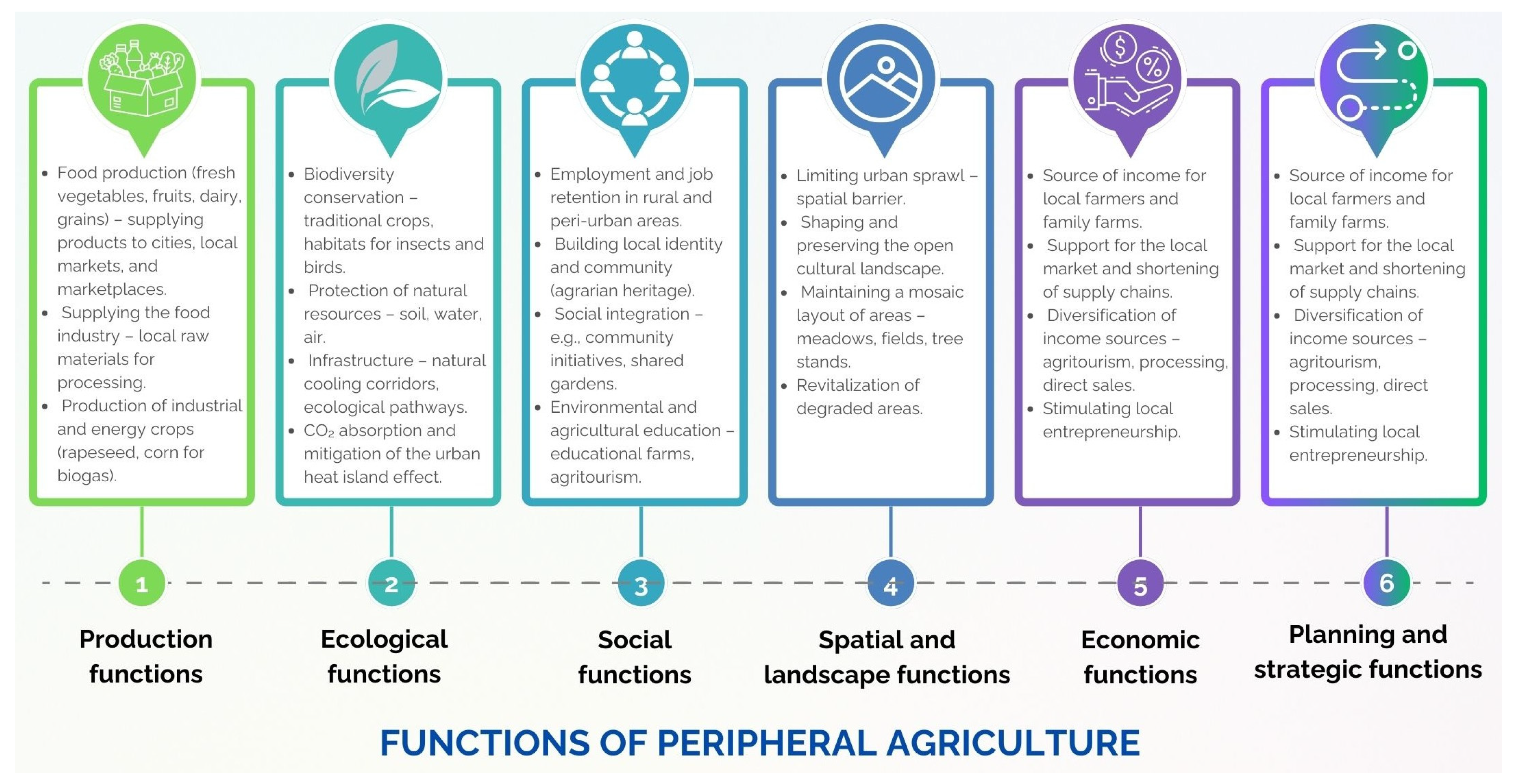
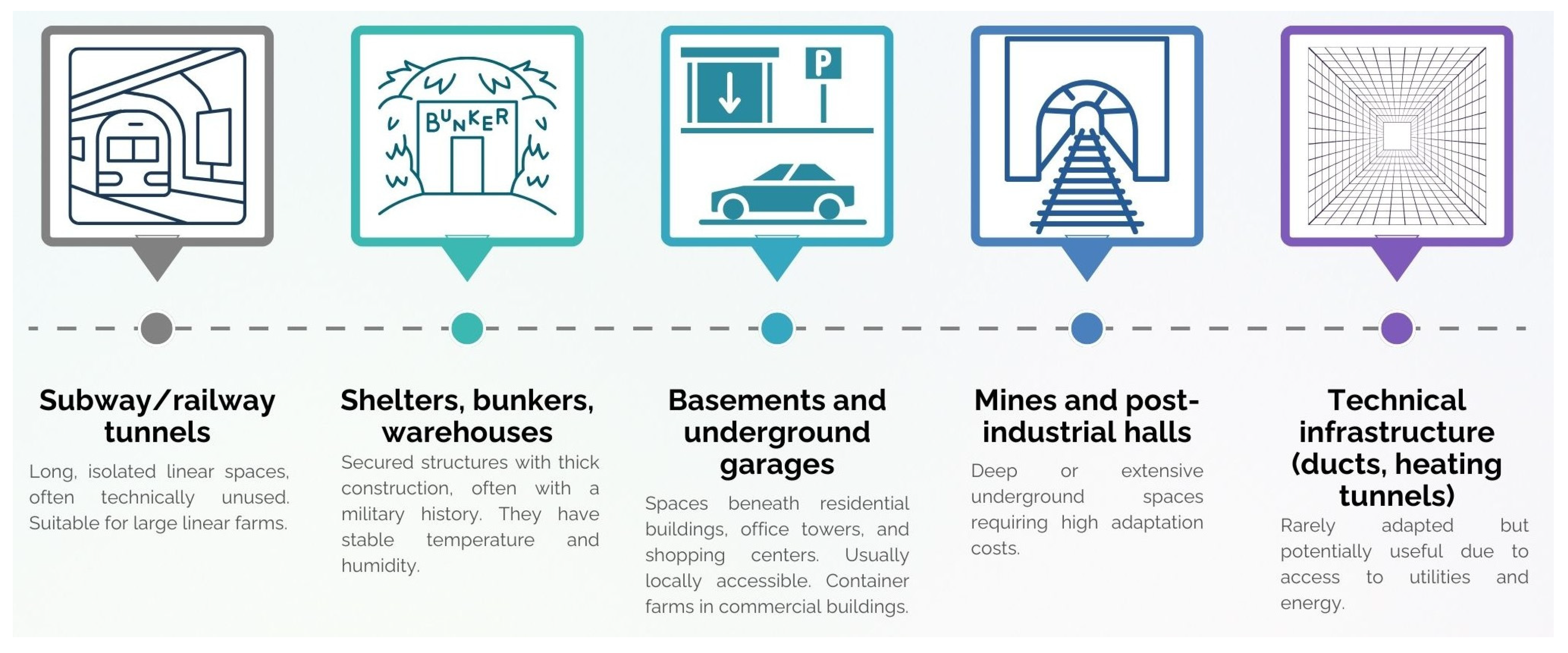
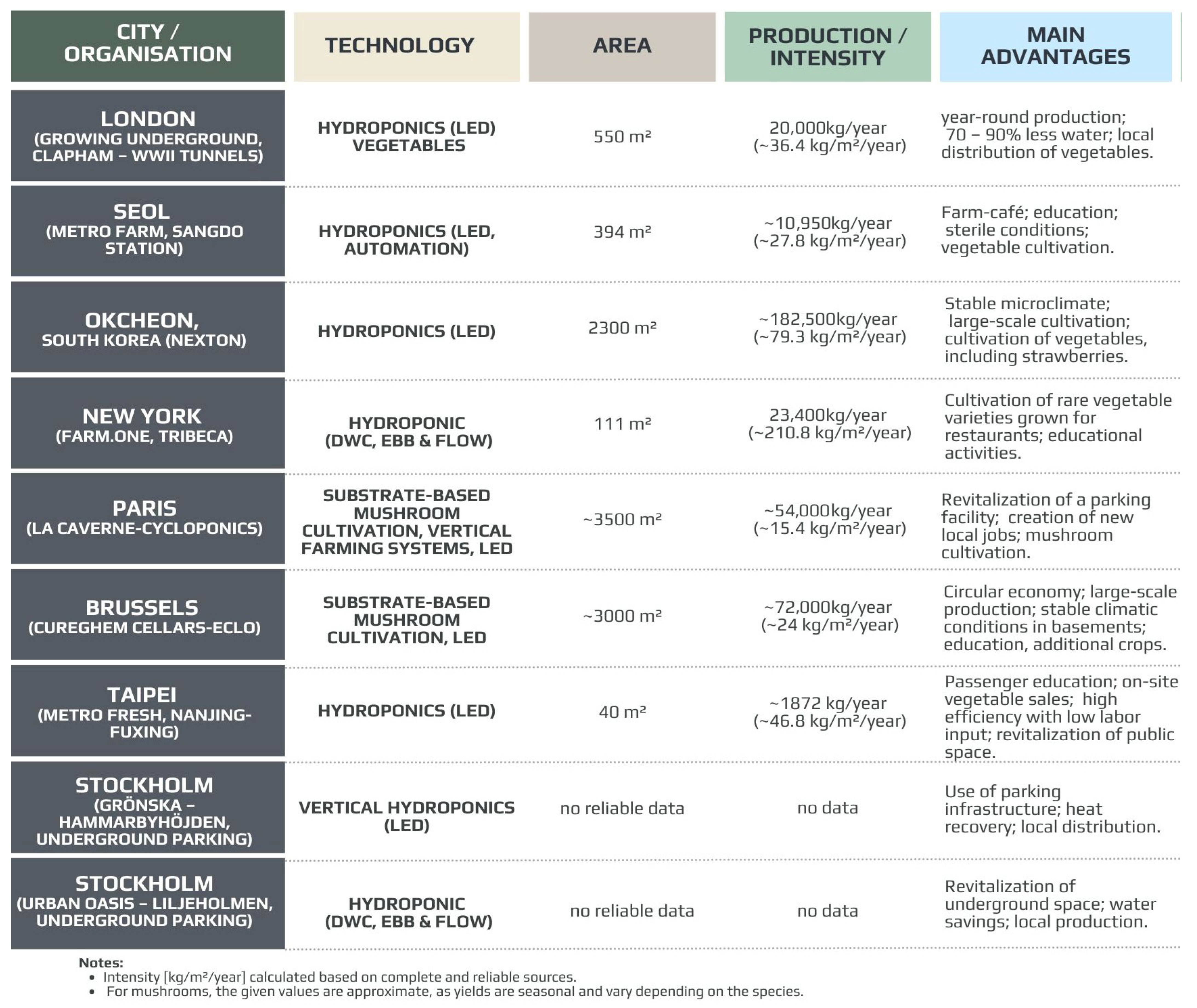
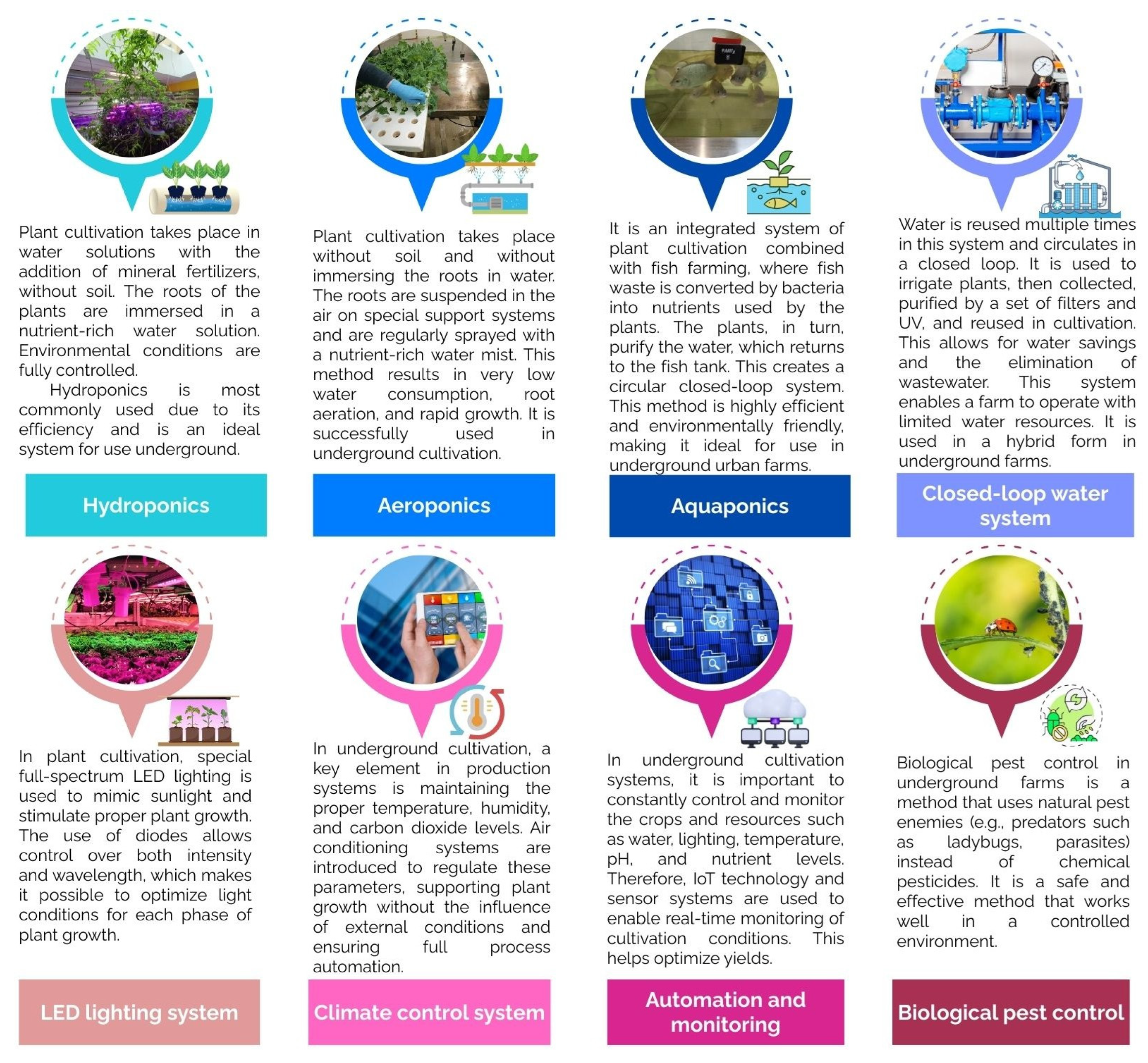
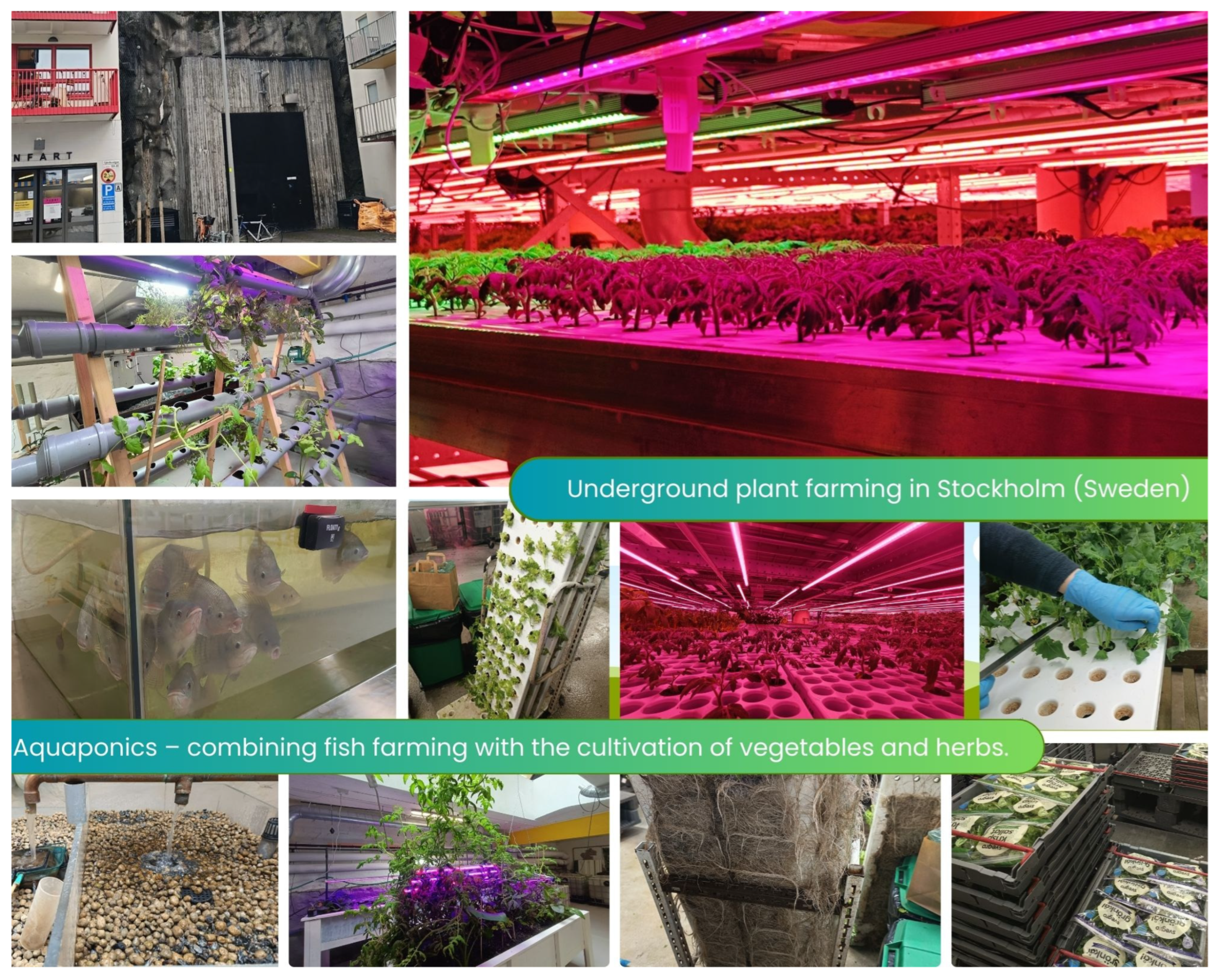
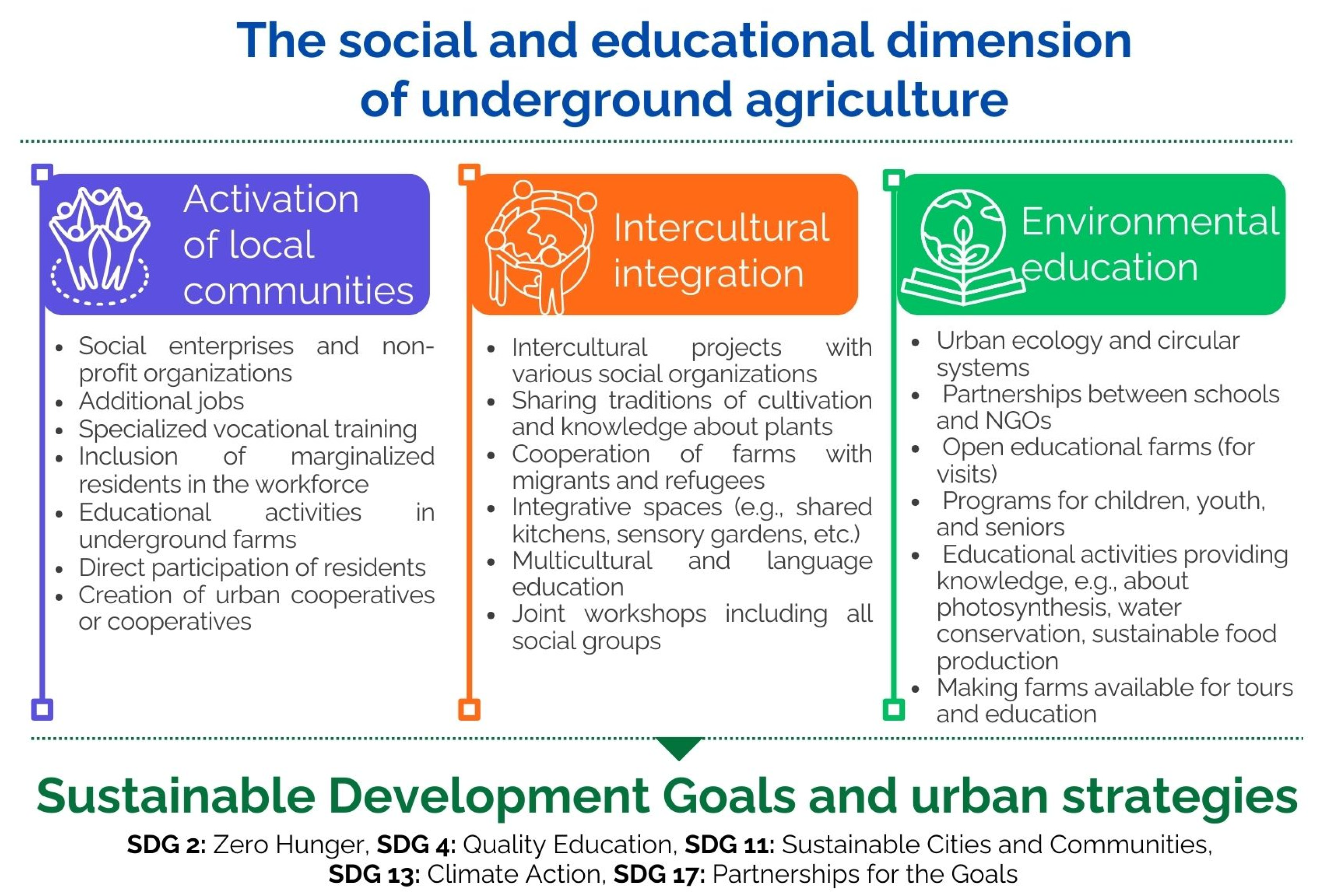
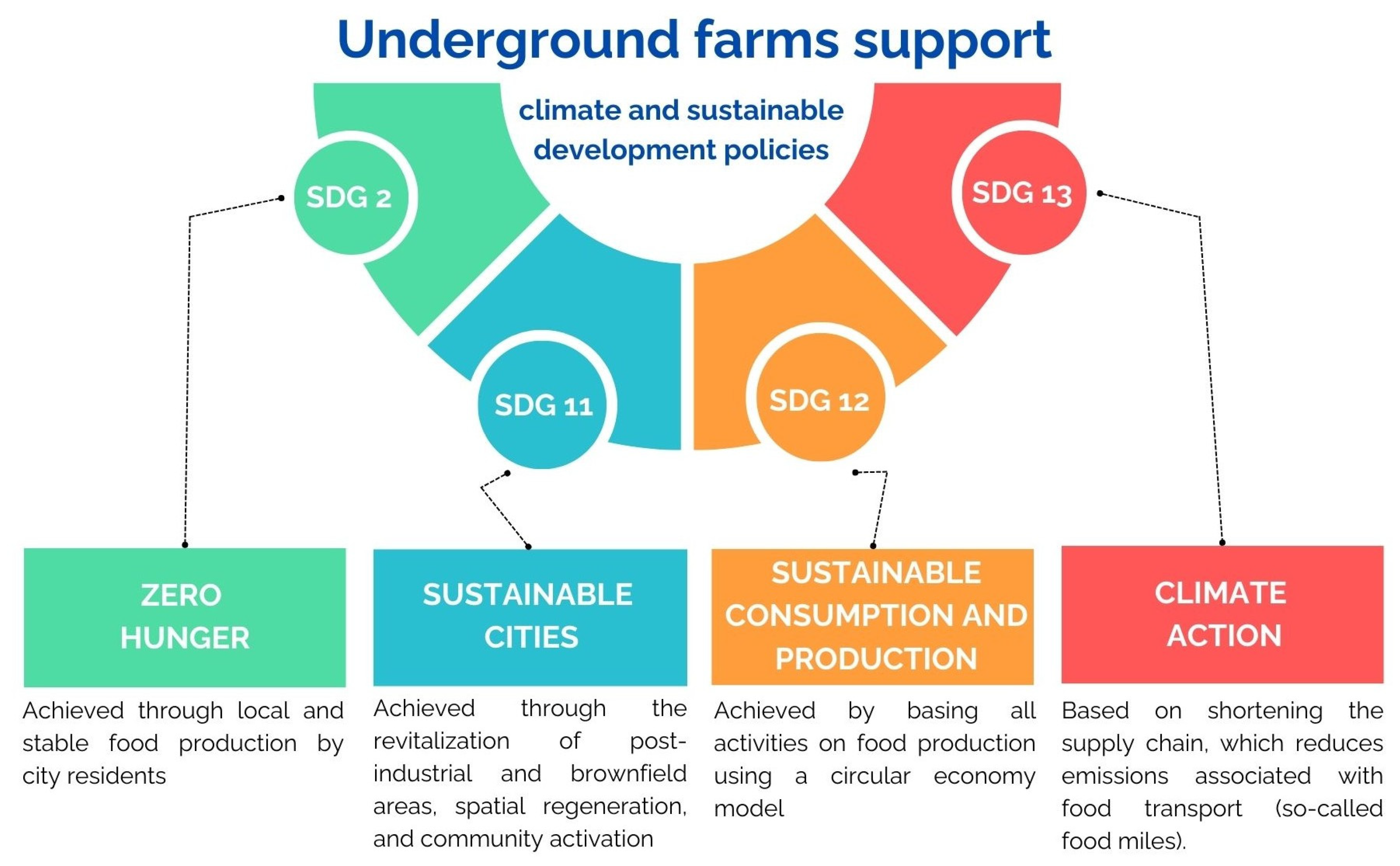
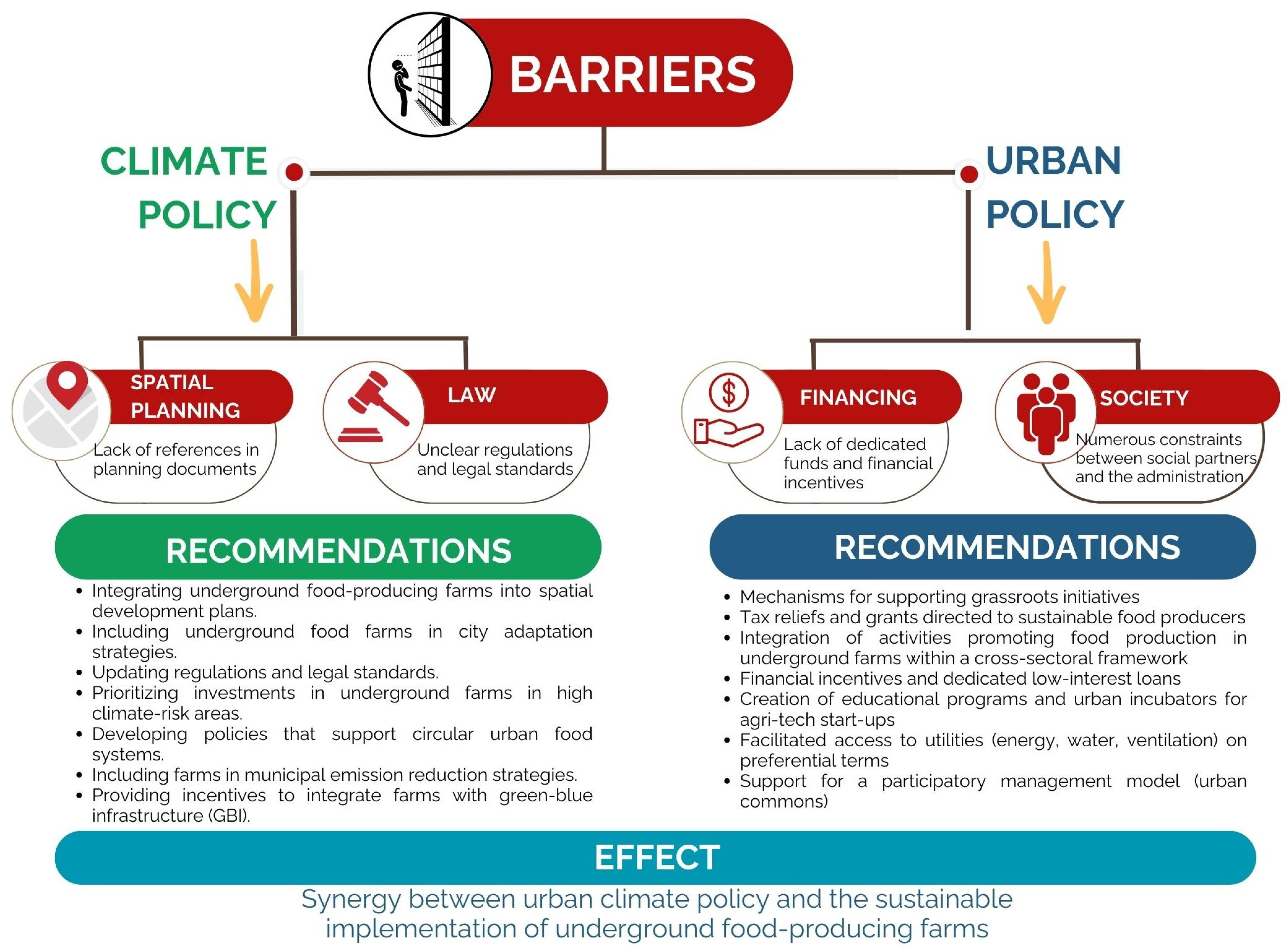
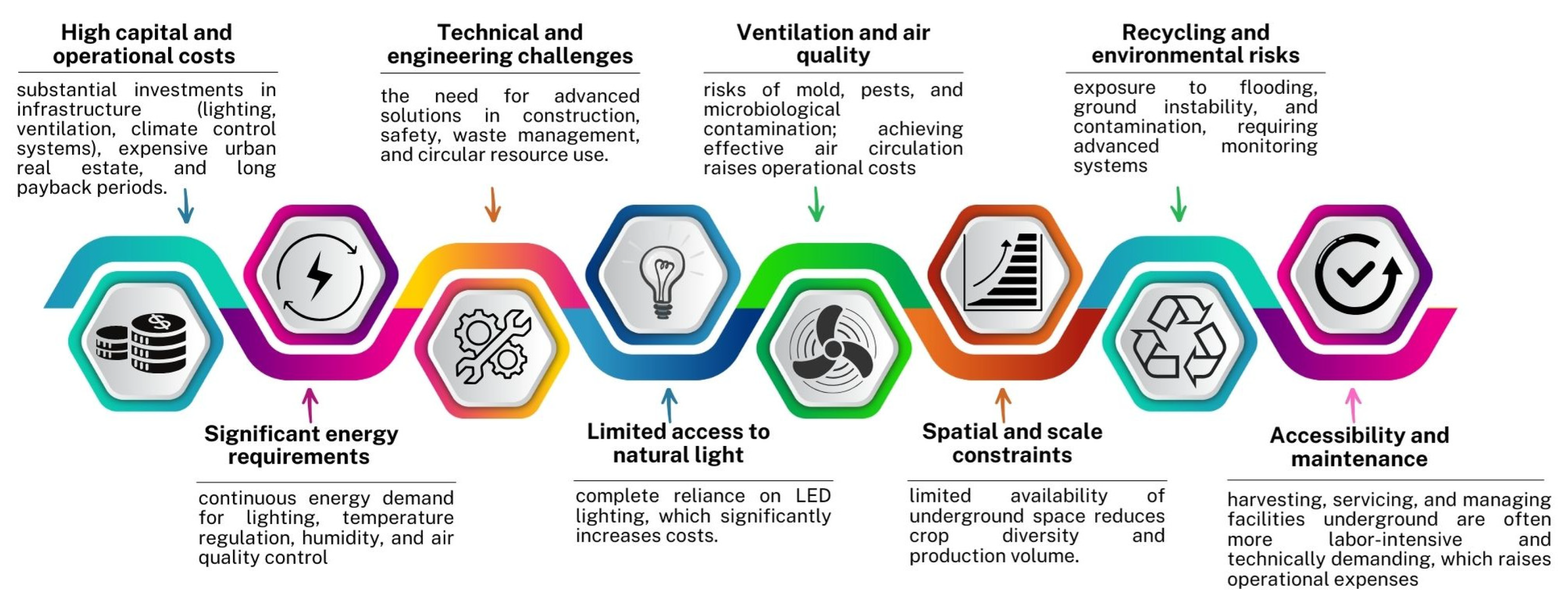
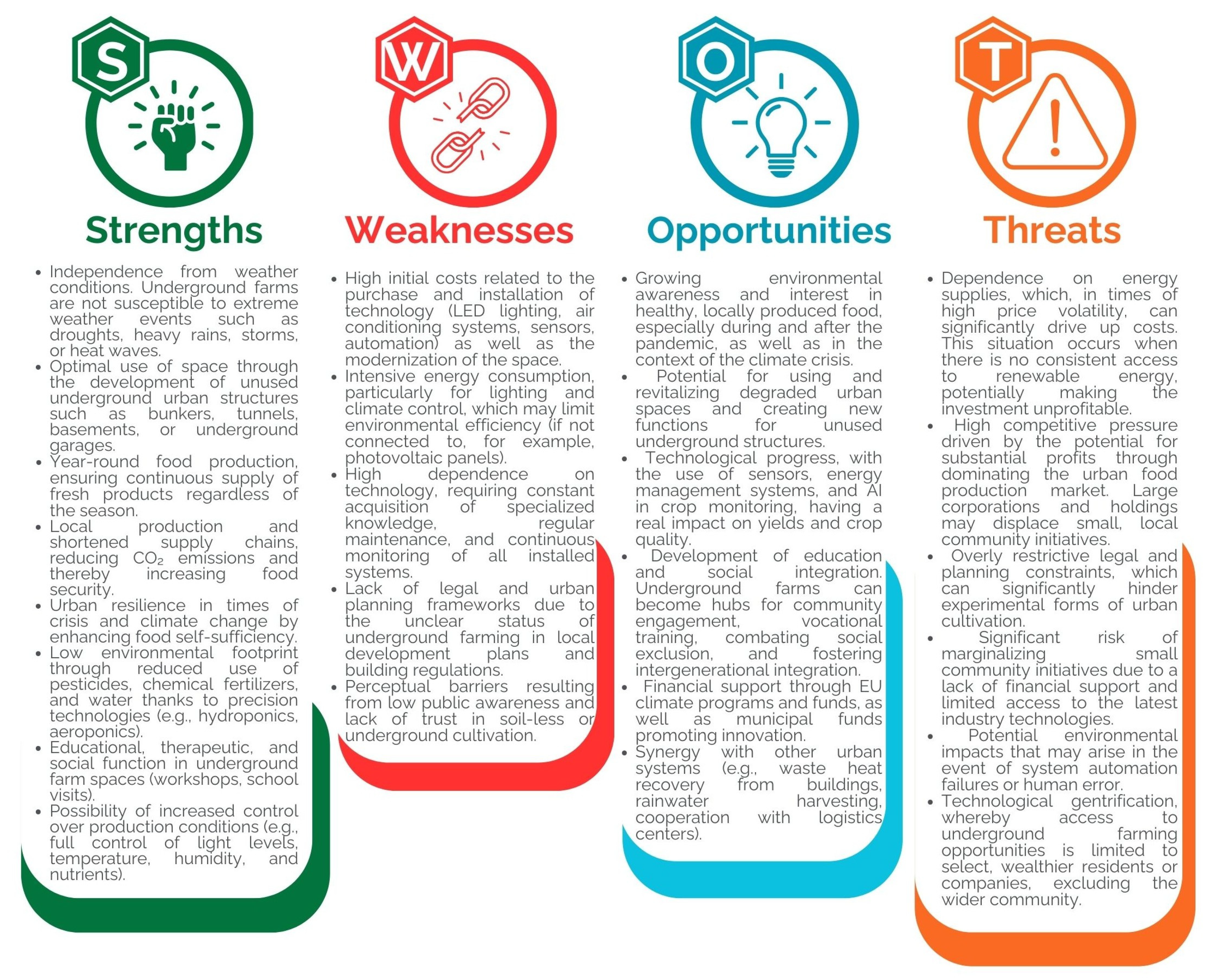
| ID | Factor | Weight (0–1) | Score (−5 to +5) | Result | Comment |
|---|---|---|---|---|---|
| S1 | Use of existing underground infrastructure | 0.25 | +5 | +1.25 | Minimizes the need for new construction investments |
| S2 | Reduction in transport emissions (proximity to consumer) | 0.20 | +4 | +0.80 | Important in urban climate policies |
| S3 | Independence from weather conditions | 0.15 | +4 | +0.60 | Ensures food production security |
| S4 | High educational and social potential | 0.10 | +3 | +0.30 | Supports local urban policies |
| W1 | High CAPEX/OPEX * costs | 0.25 | −4 | −1.00 | Limits the scale of farm implementation in the city |
| W2 | Energy intensity | 0.20 | −5 | −1.00 | High dependence of production on energy prices |
| O1 | Circular economy and industrial symbiosis | 0.20 | +5 | +1.00 | Possibility of integration with urban systems |
| O2 | Energy transition and renewable sources | 0.15 | +4 | +0.60 | Potential to reduce costs and carbon footprint |
| T1 | Risk of rising energy prices | 0.25 | −5 | −1.25 | The most significant economic threat |
| T2 | Low social acceptance | 0.15 | −3 | −0.45 | May limit implementation in cities |
| TOWS Quadrant | Number of Strategies | Key Strategic Directions | Example Priority Strategies |
|---|---|---|---|
| SO | 72 | Use of existing underground infrastructure, energy symbiosis, development of education and local brands, integration with urban policies and green financing |
|
| WO | 35 | Reducing CAPEX/OPEX costs through energy symbiosis and subsidies, improving sensory qualities, overcoming legal and social barriers, development of education and competences |
|
| ST | 19 | Strengthening competitive advantage through short supply chains, adaptation to energy and climate threats, narrative on food security |
|
| WT | 14 | Reducing energy and phytosanitary risks, cooperation in consortia, development of niche premium products, inclusion of farms in safety systems |
|
Disclaimer/Publisher’s Note: The statements, opinions and data contained in all publications are solely those of the individual author(s) and contributor(s) and not of MDPI and/or the editor(s). MDPI and/or the editor(s) disclaim responsibility for any injury to people or property resulting from any ideas, methods, instructions or products referred to in the content. |
© 2025 by the authors. Licensee MDPI, Basel, Switzerland. This article is an open access article distributed under the terms and conditions of the Creative Commons Attribution (CC BY) license (https://creativecommons.org/licenses/by/4.0/).
Share and Cite
Krzemińska, A.; Zaręba, A.; Adynkiewicz-Piragas, M.; Jia, H.; Alpuche Cruz, M.G.; Valle Cordero, L.A. Underground Food Farms as a Climate-Friendly Alternative Form of Urban Agriculture. Sustainability 2025, 17, 9392. https://doi.org/10.3390/su17219392
Krzemińska A, Zaręba A, Adynkiewicz-Piragas M, Jia H, Alpuche Cruz MG, Valle Cordero LA. Underground Food Farms as a Climate-Friendly Alternative Form of Urban Agriculture. Sustainability. 2025; 17(21):9392. https://doi.org/10.3390/su17219392
Chicago/Turabian StyleKrzemińska, Alicja, Anna Zaręba, Mariusz Adynkiewicz-Piragas, Haifeng Jia, María Guadalupe Alpuche Cruz, and Luis Antonio Valle Cordero. 2025. "Underground Food Farms as a Climate-Friendly Alternative Form of Urban Agriculture" Sustainability 17, no. 21: 9392. https://doi.org/10.3390/su17219392
APA StyleKrzemińska, A., Zaręba, A., Adynkiewicz-Piragas, M., Jia, H., Alpuche Cruz, M. G., & Valle Cordero, L. A. (2025). Underground Food Farms as a Climate-Friendly Alternative Form of Urban Agriculture. Sustainability, 17(21), 9392. https://doi.org/10.3390/su17219392












